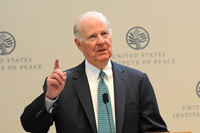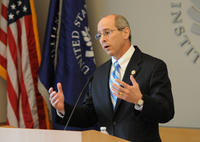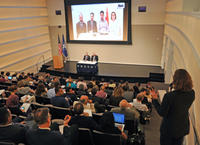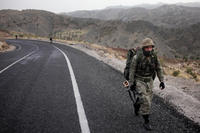As the dramatic events of the Arab Spring turn to the more mundane yet vital work of governance, constitution writing and peacebuilding, USIP is on the ground, bringing its unique brand of action and expertise to the effort.
In a period of tremendous change in parts of the world, we are asking USIP leaders, from board members to senior staff and experts, to explain the effects that events abroad and here at home will have on the United States, and the contributions the Institute can and does make. Steven Heydemann is USIP’s senior adviser for Middle East Initiatives. | Read the Q+A
Peace Briefs, Analysis and Multimedia
November 2011
 Turmoil in Syria: Reshaping the Middle East?
Turmoil in Syria: Reshaping the Middle East?
The Institute invited leading experts from the U.S. and across the Middle East to identify key vectors of influence Syria’s neighbors are bringing to bear on the conflict; to forecast how the on-going conflict in Syria will affect the delicate and volatile regional balance of power; and to examine how the Syrian opposition and the Syria regime are factoring in regional and cross-border dynamics. | Learn more
Twenty Years After Madrid
 Lessons Learned and the Way Forward for Arab-Israeli Peacemaking
Lessons Learned and the Way Forward for Arab-Israeli Peacemaking
November 2, 2011
USIP convened a full-day conference co-hosted with the James A. Baker III Institute for Public Policy. The conference featured former diplomats and international experts on eight panels, each of which explored different aspects of the challenges facing peacemaking in the Arab-Israeli conflict.
Speakers included Secretary of State James A. Baker, III, former National Security Advisers Zbigniew Brzezinski and Stephen Hadley, Ambassador Edward Djerejian and USIP President Dr. Richard H. Solomon. Former U.S. President George H. W. Bush delivered a video address. | Learn more
 Lebanon and the Arab Spring
Lebanon and the Arab Spring
May 10, 2011
A Congressional View of Lebanon's Role Amidst Historic Change in the Region
Congressman Charles Boustany of Louisiana spoke about the current situation in Lebanon and how it is fairing in the Arab Spring, as Syria and the Arab world are being rocked by historic change. | Learn more
Bahrain on the Edge
 April 26, 2011
April 26, 2011
USIP and the National Democratic Institute (NDI) held a live video-conference with senior representatives of the Bahraini opposition.
The event provided a rare opportunity to hear directly from key opposition figures and engage in a dialogue on the uprising in Bahrain and the trajectory of the movement. | Learn more
The Future of Yemen
A Rare Conversation with Yemeni Political Opposition Leaders
April 5, 2011
USIP's Yemen Working Group and the National Democratic Institute (NDI) convened a video-conference with leaders of the Yemeni opposition. This event provided a rare, on-the-record opportunity to hear directly from key opposition figures and engage in a dialogue on the uprising in Yemen. | Learn more
Explore Further
 America's Role in the World: The Costs of Walking Away by Stephen D. Krasner, a professor of international relations at Stanford University, a senior fellow at the Freeman Spogli Institute and the Stanford Institute for Economic Policy Research as well as a senior fellow at the Hoover Institution. Krasner also served as director of policy planning at the State Department between 2005 and 2007, and as a member of the policy planning staff from 2001 to 2002 at the State Department and at the National Security Council.
America's Role in the World: The Costs of Walking Away by Stephen D. Krasner, a professor of international relations at Stanford University, a senior fellow at the Freeman Spogli Institute and the Stanford Institute for Economic Policy Research as well as a senior fellow at the Hoover Institution. Krasner also served as director of policy planning at the State Department between 2005 and 2007, and as a member of the policy planning staff from 2001 to 2002 at the State Department and at the National Security Council.
His research has focused primarily on what drives international economic relations, U.S. foreign policy and sovereignty. | Read the Q+A
U.S. Policy and the Arab World
USIP’s Dan Brumberg discusses the Arab Spring and the implications for U.S. policy and U.S. policymakers. | Read the Q+A
USIP Experts on Arab Awakening One Year Later
USIP Experts Mark 1st Anniversary of Arab Awakening, Discuss Path Ahead | News Release
Eye on the Middle East and North Africa
Experts from USIP are closely following developments throughout the Middle East and North Africa. In a series of reports and interviews, they cover a wide range of issues.
